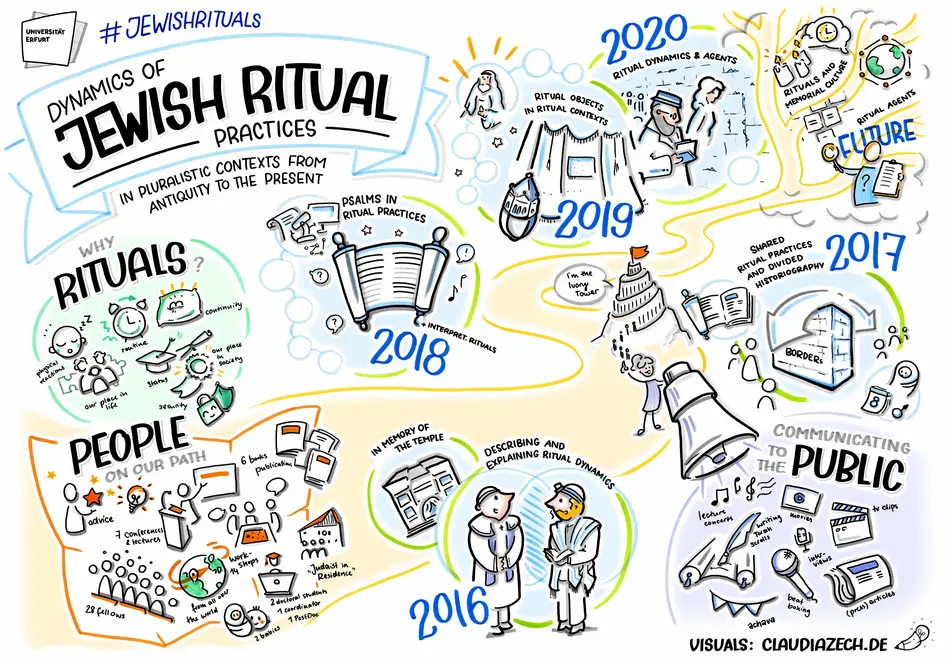At the final meeting in February, the actors took stock of the situation. And it starts with a joke...
The Hasid came through the Pearl Gate and was presented with a Leviathan so that he could eat the creature at the meal in the world to come. The Hasid asked, "Who slaughtered this Leviathan?" The answer: "Adonai slaughtered him." And the Hasid replied, "All right, I'll have some fruit."
This joke goes to the heart of what the Research Centre has been working on for the past five years: the question of ritual. For example, what makes food kosher? What does one do in Jewish tradition to maintain the kosher status of food? What rituals must be performed to feed the family in an appropriate manner according to Jewish law? However, the ritual life of people goes far beyond eating and feeding together - rituals are omnipresent and are the backbone of our daily lives, the ticking that indicates the passing of time, the routine that structures our path in life. Rituals are present everywhere.
"The journey we have taken over the past five years has been a journey that has taken us on familiar but also unknown paths," explains PD Dr. Claudia Bergmann, the coordinator of the Research Centre, and draws attention to the milestones that the researchers have passed on the way: the people who have come together at the Research Centre have studied, discussed and listened to each other; the international conferences (2016: "In Memory of the Temple / In Memory of the Ritual"; 2016: "Describing and explaining ritual dynamics"; 2017: "Common ritual practices and shared historiography: media, phenomena, topoi"; 2018: "Psalms in ritual practice in pluralistic contexts from antiquity to the present"; 2019: "Ritual objects"), workshops, lectures and publications.
But also the telling, the reporting of research results - both to the scientific community and the public - has been an important part of the Research Centre's work, says Claudia Bergmann. "In addition to communicating our work to the academic public, we have used a number of methods to address people from other fields of study as well as the interested public in the city of Erfurt and the region. An excellent cooperation has developed with those responsible for the Jewish sites in the city of Erfurt. Public discussion concerts were organised with Jascha Nemtsov, Tehila Nini Goldstein, the Klenke Quartet and Julia Adler. We also encouraged the screening of two films concerning Jewish rituals and invited the filmmaker Britta Wauer and the main protagonist, Rabbi Wolf. And we invited students from the Children's University of Erfurt to the university and presented our work to them. For example, one of our conference topics in 2019 showed third graders the methods of writing Torah scrolls. In 2018, beatboxer Joshua Leviton introduced fourth- and fifth-graders to the basics of beatboxing before he and the a cappella group he belongs to, the famous Maccabeats from New York City, performed at the ACHAVA festival."
And what remains of the work of the Research Centre? "Six published books, seven conferences, 14 workshops, 28 national and international fellows who have come to Erfurt, two doctoral students who have almost completed their dissertation, a coordinator who has habilitated and a postdoc who is well on the way to achieving her goal - these are good results," says Claudia Bergmann happily. "I think, however, what remains of our work beyond this are the many questions that have been raised but not yet answered, and the paths that lie ahead. When we look ahead, we discover many possibilities for continuing our work, there are still gaps and open questions. The research group is currently focusing on two major topics: on the one hand, the topic "Ritual Actors", which could deal with the following questions: Who are the people who invented, changed and performed rituals in religious and other contexts? What causes actors to become active when they adapt the rituals they perform to changed circumstances? What are the relationships between actors working for official institutions and those working outside institutions? Who becomes an actor in the performance of rituals at a certain point in time, and who decides who may work as such and who may not? Who initiates the change: actors or the institutions they work for? And secondly, the topic "Rituals and Remembrance Culture" and thus the questions: What role do memory and cultural heritage play in Christianity and Judaism and their respective religious rituals? What role do ritual objects and ritual spaces play in the culture of memory? Who creates the image, the ritual space, the museum, and interprets them, fills them with meaning? What role does memory culture play in modern culture, especially in the context of globalization? Dr. Claudia Bergmann: "It would be wonderful if we could raise additional funds to continue our work one day." And Prof. Dr. Benedikt Kranemann, spokesperson of the Research Centre, adds: "The intensive work of the past years has allowed a truly excellent international scientific network to grow. We are very optimistic that we can continue the Research Centre on this basis and with a new research question".

